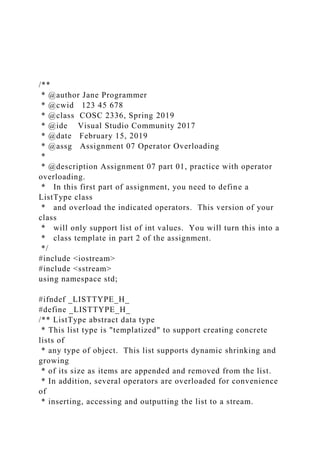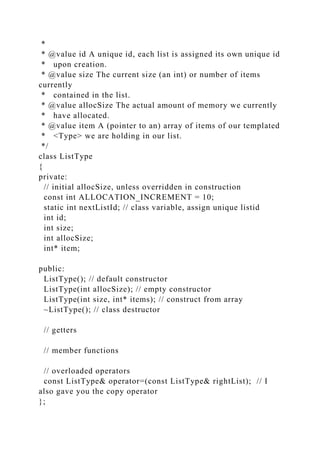The document describes an assignment to practice operator overloading by creating a ListType class that holds a list of integers. Students are tasked with implementing various member functions and overloading operators like <<, &, |, and + to provide output, appending, prepending, and concatenation capabilities. The assignment involves 7 tasks, including creating getters, a toString method, overloading << for output, and overloading operators for appending, prepending, indexing, and concatenating lists. Completing the tasks for integers earns full credit, while templatizing the class is worth 10 bonus points.
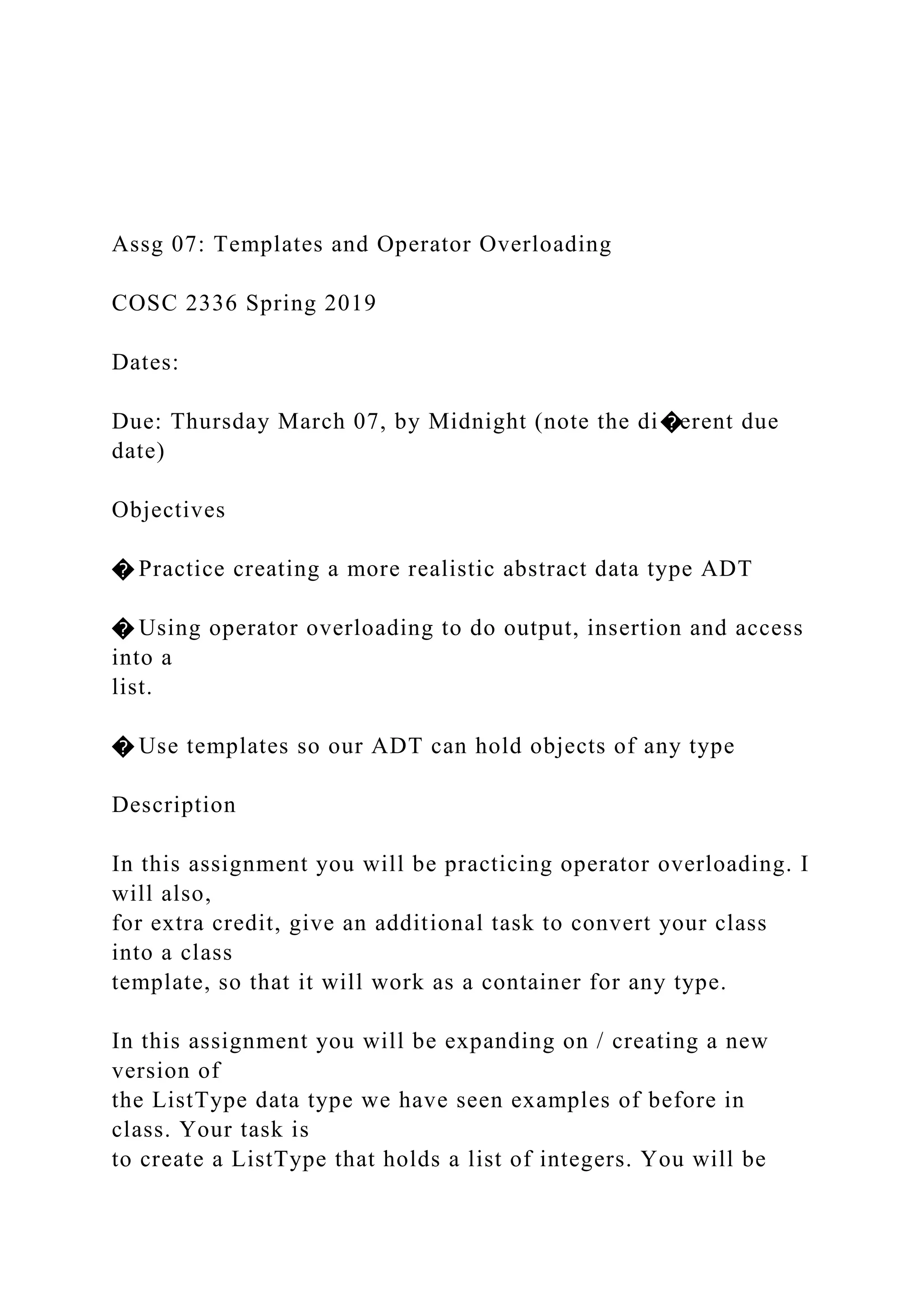
![asked to create
several member functions, and then to create several overloaded
operators
for your list of integers. Your basic task is to user operator
overloading to
support appending and prepending to a list, outputting the list
as a string
and to an output stream, accessing the list (using the indexing
operator[]),
and concatenating lists together (using operator+).
I have given you a starting template for your ListType that
already
contains 3 versions of the class constructor. I have also already
provided you
the operator= implementation, to provide the copy operator for
your class.
You should �rst get your class to work as a simple ListType
that holds a
list of integers. If you get your class working for integers and
submit it, you
1
can then turn your class into a template class, so that your list
can work on
objects of any type. I will give up to 10 bonus points for
implementations of
working class templates, if you �rst mostly have your basic
ListType working
for simple integers. As usual I have also given a �le with a
main function
and a lot of commented out tests. You should implement the
class member](https://image.slidesharecdn.com/assg07templatesandoperatoroverloadingcosc2336sprin-221015032421-3e545eba/85/Assg-07-Templates-and-Operator-OverloadingCOSC-2336-Sprin-docx-2-320.jpg)
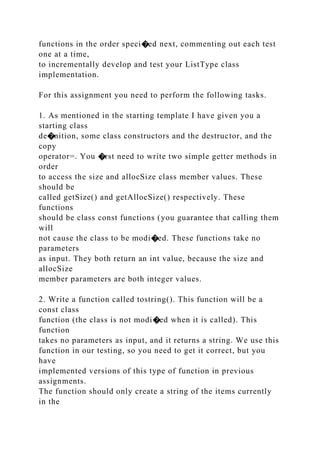
![list. So it will return a string like "[3, 5, 4, 2]" if those are the 4
items
currently in the list. See the test code for speci�cs.
3. Overload the operator<<() to provide the ability for the
ListType
class to be output to a stream. This will be a friend function,
and again
it will be pretty similar to several examples we have seen of
overloading
the output stream operator. You should use the tostring()
method
in this function, but it outputs additional information, such as
the id,
size and allocSize of the list to the output stream.
4. Create a function named appendItem(). This function takes an
int
value as its only parameter, and it does not return a value. The
indi-
cated integer value should be appended to the end of your list
when
this function is called. You need to correctly handle causing the
size of
your memory allocation to grow if needed in this function, if
your list
is currently using all of the allocated memory. Once this is
working,
2
overload the operator&() operator. We will de�ne the &
operator to
mean list appending. For example, if you do list & 5 it will](https://image.slidesharecdn.com/assg07templatesandoperatoroverloadingcosc2336sprin-221015032421-3e545eba/85/Assg-07-Templates-and-Operator-OverloadingCOSC-2336-Sprin-docx-4-320.jpg)
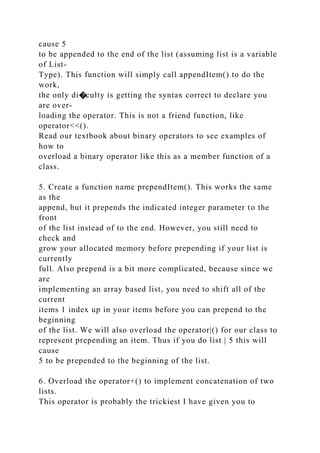
![implement.
This operator should take a const reference to another ListType
as
its parameter for input. This is the list on the right hand side of
the + operation. This function should return a reference to a
new
ListType as its result. It is important that both the input
parameter
and the return type be both reference parameters for this
function.
This function should be a const function, as it does not cause
the
original list to change. Instead you should dynamically allocate
a new
ListType in this function, �ll it with the items from the two
lists being
concatenated, and then return it as the result from this
overloaded
function. You should read our textbook example of overloading
the
operator+() and try and follow that pattern for implementing
this
function.
7. Overload the operator[] indexing operator. This is NOT a
const
member function, your list can change as a result of calling this
func-
tion. This function takes an int value as its input parameter.
This
function should return an int& reference. Again it is very
important
that this overloaded operator return a reference. If this operator
cor-
rectly returns an int&, it can actually be used as a setter to
set/change](https://image.slidesharecdn.com/assg07templatesandoperatoroverloadingcosc2336sprin-221015032421-3e545eba/85/Assg-07-Templates-and-Operator-OverloadingCOSC-2336-Sprin-docx-6-320.jpg)
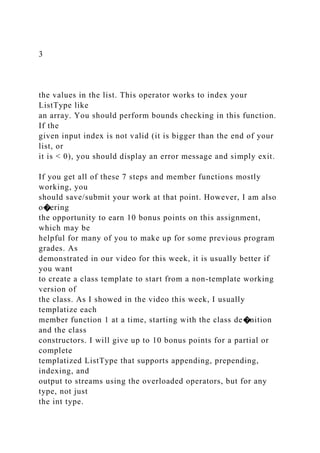
![You will again be given 3 starting template �les as usual, an
assg-07.cpp
�le of tests of your code, and a ListType.hpp and ListType.cpp
header and
implementation �le. As before, you should practice incremental
develop-
ment, and uncomment the tests in the assg-07.cpp �le one at a
time, and
implement the functions in the order speci�ed. If you
implement your code
correctly and uncomment all of the tests, you should get the
following correct
output:
--------- Test constructors and getters -------------------------
l1 size: 0 allocSize: 0
l2 size: 0 allocSize: 7
l3 size: 5 allocSize: 5
--------- Test output stream operator ---------------------------
l2 items: []
ListType <id=2>
size = 0
allocSize = 7
items : []
l3 items: [3, 9, 2, 7, 5]](https://image.slidesharecdn.com/assg07templatesandoperatoroverloadingcosc2336sprin-221015032421-3e545eba/85/Assg-07-Templates-and-Operator-OverloadingCOSC-2336-Sprin-docx-8-320.jpg)
![4
ListType <id=3>
size = 5
allocSize = 5
items : [3, 9, 2, 7, 5]
--------- Test append and operator& -----------------------------
<ListType::growListIfNeeded()> LOG: grow list current alloc 0
new alloc 10
append to empty l1:
ListType <id=1>
size = 1
allocSize = 10
items : [1]
<ListType::growListIfNeeded()> LOG: grow list current alloc 5
new alloc 15
append to nonempty l3:
ListType <id=3>
size = 6](https://image.slidesharecdn.com/assg07templatesandoperatoroverloadingcosc2336sprin-221015032421-3e545eba/85/Assg-07-Templates-and-Operator-OverloadingCOSC-2336-Sprin-docx-9-320.jpg)
![allocSize = 15
items : [3, 9, 2, 7, 5, 12]
operator& test l3:
ListType <id=3>
size = 8
allocSize = 15
items : [3, 9, 2, 7, 5, 12, 6, 11]
mixing append and operator& l1:
ListType <id=1>
size = 5
allocSize = 10
items : [1, 4, 3, 7, 0]
--------- Test prepend and operator| ----------------------------
prepend to empty l2:
ListType <id=2>
5
size = 1](https://image.slidesharecdn.com/assg07templatesandoperatoroverloadingcosc2336sprin-221015032421-3e545eba/85/Assg-07-Templates-and-Operator-OverloadingCOSC-2336-Sprin-docx-10-320.jpg)
![allocSize = 7
items : [8]
prepend to nonempty l3:
ListType <id=3>
size = 9
allocSize = 15
items : [8, 3, 9, 2, 7, 5, 12, 6, 11]
operator| test l3:
ListType <id=3>
size = 11
allocSize = 15
items : [4, 13, 8, 3, 9, 2, 7, 5, 12, 6, 11]
<ListType::growListIfNeeded()> LOG: grow list current alloc 7
new alloc 17
mixing prepend and append and operators l2:
ListType <id=2>
size = 8
allocSize = 17](https://image.slidesharecdn.com/assg07templatesandoperatoroverloadingcosc2336sprin-221015032421-3e545eba/85/Assg-07-Templates-and-Operator-OverloadingCOSC-2336-Sprin-docx-11-320.jpg)
![items : [4, 0, 13, 5, 7, 8, 11, 9]
--------- Test concatenation operator ----------------------------
Test basic append, new l4:
ListType <id=4>
size = 19
allocSize = 19
items : [4, 0, 13, 5, 7, 8, 11, 9, 4, 13, 8, 3, 9, 2, 7, 5, 12, 6, 11]
Test basic append, new l5:
ListType <id=6>
size = 24
allocSize = 24
items : [1, 4, 3, 7, 0, 4, 13, 8, 3, 9, 2, 7, 5, 12, 6, 11, 4, 0, 13, 5,
7, 8, 11, 9]
Test concatentate emptyList, new l6:
ListType <id=8>
6
size = 8
allocSize = 8](https://image.slidesharecdn.com/assg07templatesandoperatoroverloadingcosc2336sprin-221015032421-3e545eba/85/Assg-07-Templates-and-Operator-OverloadingCOSC-2336-Sprin-docx-12-320.jpg)
![items : [4, 0, 13, 5, 7, 8, 11, 9]
Test concatentate emptyList, new l7:
ListType <id=9>
size = 5
allocSize = 5
items : [1, 4, 3, 7, 0]
--------- Test operator[] indexing ------------------------------
l1[0] == 1
l1[2] == 3
l1[4] == 0
Iterate over l2:
ListType <id=2>
size = 8
allocSize = 17
items : [4, 0, 13, 5, 7, 8, 11, 9]
l2[0] == 4
l2[1] == 0
l2[2] == 13](https://image.slidesharecdn.com/assg07templatesandoperatoroverloadingcosc2336sprin-221015032421-3e545eba/85/Assg-07-Templates-and-Operator-OverloadingCOSC-2336-Sprin-docx-13-320.jpg)
![l2[3] == 5
l2[4] == 7
l2[5] == 8
l2[6] == 11
l2[7] == 9
ListType setter using operator[] l2[0] == 8
ListType setter using operator[] l2[4] == -7
ListType setter using operator[] l2[7] == 42
--------- main exiting scope, destructors should be invoked -----
ListType: <id=9> out of scope, size: 5 allocSize: 5
ListType: <id=8> out of scope, size: 8 allocSize: 8
ListType: <id=7> out of scope, size: 0 allocSize: 0
7
ListType: <id=6> out of scope, size: 24 allocSize: 24
ListType: <id=4> out of scope, size: 19 allocSize: 19
ListType: <id=3> out of scope, size: 11 allocSize: 15
ListType: <id=2> out of scope, size: 8 allocSize: 17](https://image.slidesharecdn.com/assg07templatesandoperatoroverloadingcosc2336sprin-221015032421-3e545eba/85/Assg-07-Templates-and-Operator-OverloadingCOSC-2336-Sprin-docx-14-320.jpg)
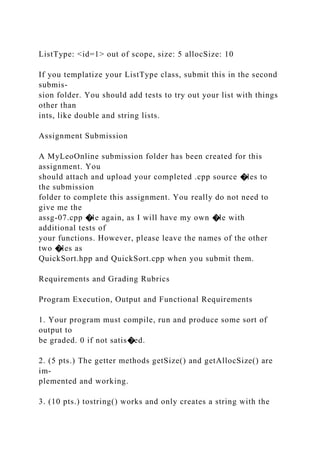
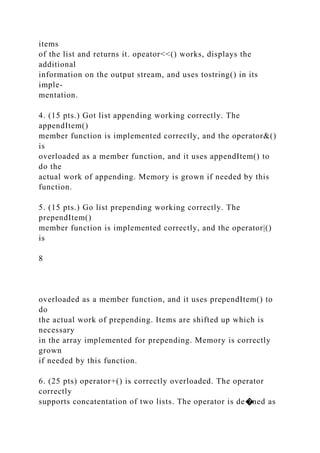
![a class
const method. The operator correctly dynamically allocates a
new
list and puts the items of the two lists into it, and returns this
newly
allocated object as its result. A reference to the other list is
given as
input, and this function returns a refereunce to a list as the
result.
7. (20 pts) operator[] is correctly overloaded. The operator
returns an
int reference as its result. The operator correctly checks for
bounds
access errors, for indexes to big or less than 0. The operator
correctly
works as a setter method, so that values can be
modi�ed/assigned in
the list.
8. (5 pts.) All output is correct and matches the correct example
output.
9. (5 pts.) Followed class style guidelines, especially those
mentioned
below.
10. (10 bonus pts.) You may templatize your class and submit it
(complete
or partial) for up to 10 bonus points. Your templatized class
must
support all of the overloaded operations (append, prepend,
indexing,
output stream), and work with any class, like string, double, etc.
Program Style](https://image.slidesharecdn.com/assg07templatesandoperatoroverloadingcosc2336sprin-221015032421-3e545eba/85/Assg-07-Templates-and-Operator-OverloadingCOSC-2336-Sprin-docx-17-320.jpg)
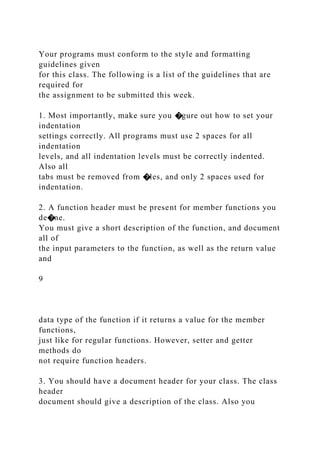
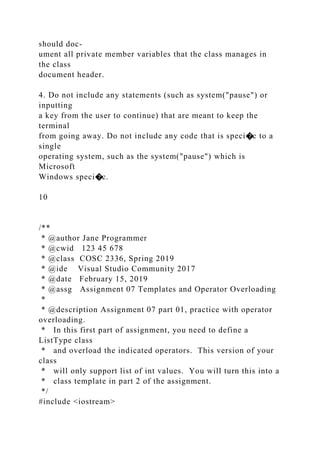
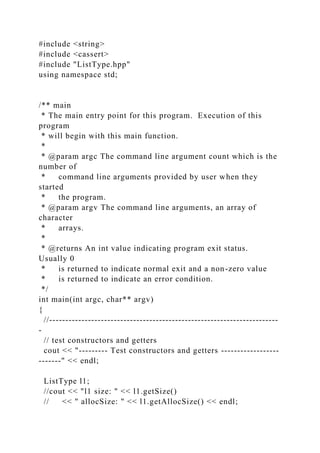
![//assert(l1.getSize() == 0);
//assert(l1.getAllocSize() == 0);
ListType l2(7); // empty list but with room for 7 items
//cout << "l2 size: " << l2.getSize()
// << " allocSize: " << l2.getAllocSize() << endl;
//assert(l2.getSize() == 0);
//assert(l2.getAllocSize() == 7);
int size = 5;
int items[] = {3, 9, 2, 7, 5};
ListType l3(size, items);
//cout << "l3 size: " << l3.getSize()
// << " allocSize: " << l3.getAllocSize() << endl;
//assert(l3.getSize() == 5);
//assert(l3.getAllocSize() == 5);
cout << endl << endl;
//-----------------------------------------------------------------------
-
// test output stream operator implementation
cout << "--------- Test output stream operator --------------------
-------" << endl;
//cout << "l2 items: " << l2.tostring() << endl;
//assert(l2.tostring() == "[]");
//cout << l2 << endl << endl;
//cout << "l3 items: " << l3.tostring() << endl;
//assert(l3.tostring() == "[3, 9, 2, 7, 5]");
//cout << l3 << endl << endl;
cout << endl << endl;](https://image.slidesharecdn.com/assg07templatesandoperatoroverloadingcosc2336sprin-221015032421-3e545eba/85/Assg-07-Templates-and-Operator-OverloadingCOSC-2336-Sprin-docx-21-320.jpg)
![//-----------------------------------------------------------------------
-
// test appending and operator& overloading
cout << "--------- Test append and operator& --------------------
---------" << endl;
// append to empty list
//l1.appendItem(1);
//cout << "append to empty l1: " << endl << l1 << endl;
//assert(l1.tostring() == "[1]" );
//assert(l1.getSize() == 1);
//assert(l1.getAllocSize() == 10);
// append to non empty list
//l3.appendItem(12);
//cout << "append to nonempty l3: " << endl << l3 << endl;
//assert(l3.tostring() == "[3, 9, 2, 7, 5, 12]" );
//assert(l3.getSize() == 6);
//assert(l3.getAllocSize() == 15);
// append 2 items using operator& and test
//l3 & 6;
//l3 & 11;
//cout << "operator& test l3: " << endl << l3 << endl;
//assert(l3.tostring() == "[3, 9, 2, 7, 5, 12, 6, 11]" );
//assert(l3.getSize() == 8);
//assert(l3.getAllocSize() == 15);
// some more, mix up append function and operator
//l1.appendItem(4);
//l1 & 3;
//l1 & 7;
//l1.appendItem(0);
//cout << "mixing append and operator& l1: " << endl << l1
<< endl;](https://image.slidesharecdn.com/assg07templatesandoperatoroverloadingcosc2336sprin-221015032421-3e545eba/85/Assg-07-Templates-and-Operator-OverloadingCOSC-2336-Sprin-docx-22-320.jpg)
![//assert(l1.tostring() == "[1, 4, 3, 7, 0]");
//assert(l1.getSize() == 5);
//assert(l1.getAllocSize() == 10);
cout << endl << endl;
//-----------------------------------------------------------------------
-
// test prepending operator| overloading
cout << "--------- Test prepend and operator| ---------------------
-------" << endl;
// prepend to empty list
//l2.prependItem(8);
//cout << "prepend to empty l2: " << endl << l2 << endl;
//assert(l2.tostring() == "[8]" );
//assert(l2.getSize() == 1);
//assert(l2.getAllocSize() == 7);
// prepend to nonempty list
//l3.prependItem(8);
//cout << "prepend to nonempty l3: " << endl << l3 << endl;
//assert(l3.tostring() == "[8, 3, 9, 2, 7, 5, 12, 6, 11]" );
//assert(l3.getSize() == 9);
//assert(l3.getAllocSize() == 15);
// operator| test
//l3 | 13;
//l3 | 4;
//cout << "operator| test l3: " << endl << l3 << endl;
//assert(l3.tostring() == "[4, 13, 8, 3, 9, 2, 7, 5, 12, 6, 11]");
//assert(l3.getSize() == 11);
//assert(l3.getAllocSize() == 15);
// some more, mix up prepend function and operator](https://image.slidesharecdn.com/assg07templatesandoperatoroverloadingcosc2336sprin-221015032421-3e545eba/85/Assg-07-Templates-and-Operator-OverloadingCOSC-2336-Sprin-docx-23-320.jpg)
![//l2.prependItem(7);
//l2 & 11;
//l2 | 5;
//l2.appendItem(9);
//l2 | 13;
//l2 | 0;
//l2 | 4;
//cout << "mixing prepend and append and operators l2: " <<
endl << l2 << endl;
//assert(l2.tostring() == "[4, 0, 13, 5, 7, 8, 11, 9]");
//assert(l2.getSize() == 8);
//assert(l2.getAllocSize() == 17);
cout << endl << endl;
//-----------------------------------------------------------------------
-
// test concatenation
cout << "--------- Test concatenation operator -------------------
---------" << endl;
//ListType l4 = l2 + l3;
//cout << "Test basic append, new l4: " << endl << l4 << endl;
//assert(l4.tostring() == "[4, 0, 13, 5, 7, 8, 11, 9, 4, 13, 8, 3, 9,
2, 7, 5, 12, 6, 11]");
//assert(l4.getSize() == 19);
//assert(l4.getAllocSize() == 19);
//ListType l5 = l1 + l3 + l2;
//cout << "Test basic append, new l5: " << endl << l5 << endl;
//assert(l5.tostring() == "[1, 4, 3, 7, 0, 4, 13, 8, 3, 9, 2, 7, 5,
12, 6, 11, 4, 0, 13, 5, 7, 8, 11, 9]");
//assert(l5.getSize() == 24);
//assert(l5.getAllocSize() == 24);](https://image.slidesharecdn.com/assg07templatesandoperatoroverloadingcosc2336sprin-221015032421-3e545eba/85/Assg-07-Templates-and-Operator-OverloadingCOSC-2336-Sprin-docx-24-320.jpg)
![//ListType emptyList;
//ListType l6 = l2 + emptyList;
//cout << "Test concatentate emptyList, new l6: " << endl <<
l6 << endl;
//assert(l6.tostring() == l2.tostring());
//assert(l6.getSize() == 8);
//assert(l6.getAllocSize() == 8);
//ListType l7 = emptyList + l1;
//cout << "Test concatentate emptyList, new l7: " << endl <<
l7 << endl;
//assert(l7.tostring() == l1.tostring());
//assert(l7.getSize() == 5);
//assert(l7.getAllocSize() == 5);
cout << endl << endl;
//-----------------------------------------------------------------------
-
// test operator[] indexing and setter
cout << "--------- Test operator[] indexing -----------------------
-------" << endl;
//cout << "l1[0] == " << l1[0] << endl;
//assert(l1[0] == 1);
//cout << "l1[2] == " << l1[2] << endl;
//assert(l1[2] == 3);
//cout << "l1[4] == " << l1[4] << endl;
//assert(l1[4] == 0);
//cout << "Iterate over l2:" << endl << l2 << endl;
//for (int index = 0; index < l2.getSize(); index++)
//{
// cout << " l2[" << index << "] == " << l2[index] << endl;
//}](https://image.slidesharecdn.com/assg07templatesandoperatoroverloadingcosc2336sprin-221015032421-3e545eba/85/Assg-07-Templates-and-Operator-OverloadingCOSC-2336-Sprin-docx-25-320.jpg)
![//cout << endl;
//l2[0] = 8;
//cout << "ListType setter using operator[] l2[0] == " << l2[0]
<< endl;
//assert(l2[0] == 8);
//l2[4] = -7;
//cout << "ListType setter using operator[] l2[4] == " << l2[4]
<< endl;
//assert(l2[4] == -7);
//l2[7] = 42;
//cout << "ListType setter using operator[] l2[7] == " << l2[7]
<< endl;
//assert(l2[7] == 42);
// test bounds checking on operator[]
// you should uncomment these to test, but you shouldn't leave
them uncommented
// should cause exit and error message
//cout << l2[-5];
// should cause exit and error message
//cout << l2[8];
cout << endl << endl;
//-----------------------------------------------------------------------
-
// test out of scope, destructors should be called
cout << "--------- main exiting scope, destructors should be
invoked -----" << endl;](https://image.slidesharecdn.com/assg07templatesandoperatoroverloadingcosc2336sprin-221015032421-3e545eba/85/Assg-07-Templates-and-Operator-OverloadingCOSC-2336-Sprin-docx-26-320.jpg)
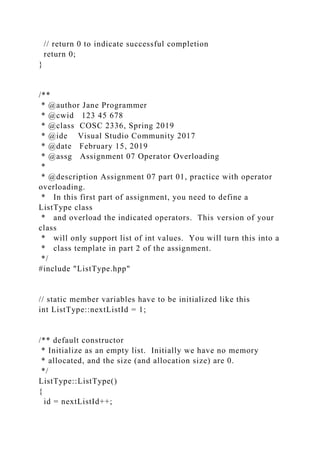
![size = allocSize = 0;
item = NULL;
}
/** constructor (empty)
* Initialize as an empty list with indicated iniaial
* size of memory allocated.
*
* @param allocSize The initialze size for the empty list.
*/
ListType::ListType(int allocSize)
{
id = nextListId++;
size = 0;
this->allocSize = allocSize;
item = new int[this->allocSize];
}
/** constructor (array)
* Initialize a list using an array of items for the initial values
* in the list.
*
* @param size The number of items in the array given for
initialization.
* @param items An array (pointer to base address) of items to
initialize
* this list with.
*/
ListType::ListType(int size, int* initItem)
{
id = nextListId++;
this->size = size;
this->allocSize = size;
item = new int[this->size];](https://image.slidesharecdn.com/assg07templatesandoperatoroverloadingcosc2336sprin-221015032421-3e545eba/85/Assg-07-Templates-and-Operator-OverloadingCOSC-2336-Sprin-docx-28-320.jpg)
![// copy the items into this list
for (int index = 0; index < this->size; index++)
{
item[index] = initItem[index];
}
}
/** destructor
* The class destructor. Be good stewards of memory and make
* sure that we free up memory allocated to hold our list items
* by this object when it goes out of scope. We display some
* information for debugging/tracking ListType destruction.
*/
ListType::~ListType()
{
cout << "ListType: <id=" << id << "> out of scope, size: "
<< size
<< " allocSize: " << allocSize << endl;
// be a good memory manager, free up memory we have
allocated
if (item != NULL)
{
delete [] item;
}
}
/** overload operator=
* Overload the operator= assignment operator. Whenever one
list
* variable is assigned to another this operator is invoked.
*
* @param rhs The list on the right hand side of the assignment,](https://image.slidesharecdn.com/assg07templatesandoperatoroverloadingcosc2336sprin-221015032421-3e545eba/85/Assg-07-Templates-and-Operator-OverloadingCOSC-2336-Sprin-docx-29-320.jpg)
![the
* contents of which is to be (deep) copied to this list contents.
*
* @returns ListType Returns a reference to this list, after
contents
* have been copied/assigned.
*/
const ListType& ListType::operator=(const ListType& rhs)
{
// only assign if not doing a self-assignment
if (this != &rhs)
{
// copy the values from rightList into this list
int newAllocSize = rhs.size;
// if not enough space, grow our list
if (this->allocSize < newAllocSize)
{
int* newItem = new int[newAllocSize];
delete [] item;
item = newItem;
this->allocSize = newAllocSize;
}
// copy the items from righ hand side into this list
for (int index = 0; index < rhs.size; index++)
{
this->item[index] = rhs.item[index];
}
this->size = rhs.size;
}
// return the object assigned
return *this;
}](https://image.slidesharecdn.com/assg07templatesandoperatoroverloadingcosc2336sprin-221015032421-3e545eba/85/Assg-07-Templates-and-Operator-OverloadingCOSC-2336-Sprin-docx-30-320.jpg)
